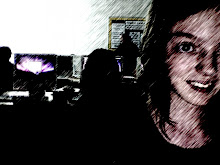As usual with research, you end up with more questions than answers. These are the ones I ended up with...
How long does it take for words to get in the dictionary?
Are there any words with funny stories behind them?
Why do we have a dictionary that is supposedly better than the rest?
What do all those funny words mean??
Thursday, October 23, 2008
Changing your mind
As I said already, on this project I came up with different beliefs and opinions. I am not exactly sure what made me change my mind, but I think it's something to do with this:
Every word I heard from people has a story behind it. How is that any different than the dictionary words?
Every word I heard from people has a story behind it. How is that any different than the dictionary words?
Wednesday, October 22, 2008
Recommendations
I think in the future I should be more specific with my project. I kind of had two areas- the made-up word area and the dictionary area. In the future I will be sure to pick one right from the start.
Comments on my project
I think this project has really opened my mind. I used to think that it wasn't a word if it wasn't in the dictionary, but I have changed my mind. I now think that if people know what you're talking about, it's a word. Thank you to all of you who have let me see that.
Friday, October 17, 2008
Wednesday, October 15, 2008
Survey
Rate your disagreement or agreement of this statement on a scale of 1 to 5.
If it’s not in the dictionary, it’s not a word.
What’s a made-up or slang word that you use?
Tell the story behind it. (Briefly please)
Is it OK to use things that aren’t words in conversation?
Yes/No/Maybe
If it’s not in the dictionary, it’s not a word.
What’s a made-up or slang word that you use?
Tell the story behind it. (Briefly please)
Is it OK to use things that aren’t words in conversation?
Yes/No/Maybe
Thursday, October 9, 2008
Source so far
"Merriam-Webster Online." Dictionary and Thesaurus - Merriam-Webster Online. 9 Oct. 2008 http://www.merriam-webster.com/help/faq/words_in.htm
TADA. A source.
TADA. A source.
Wednesday, October 8, 2008
Summarization
How does a word get in the dictionary?
Dictionary staff track the usage of the word: how it's used and how often it's used. They also spend around 2 hours a day reading modern texts and writing down possible candidates of new words. They also study variations on words that already exist and variations in usage. Then it is put on a piece of paper as a citation. The citations include information about the word. Once there are enough citations for a word or variant, then it is put into the next edition of the dictionary. Another way is that if a word appears all at once due to some huge event, it is included, too.
Dictionary staff track the usage of the word: how it's used and how often it's used. They also spend around 2 hours a day reading modern texts and writing down possible candidates of new words. They also study variations on words that already exist and variations in usage. Then it is put on a piece of paper as a citation. The citations include information about the word. Once there are enough citations for a word or variant, then it is put into the next edition of the dictionary. Another way is that if a word appears all at once due to some huge event, it is included, too.
Tuesday, October 7, 2008
Research Plans
Primary Research!!
For my primary research I'm going to interview people on what they think defines a word, and what is a good example of a made-up word that they use on a regular basis.
Secondary Research!!
For my secondary research I'm going to look up articles from smart professional word people and etymologists and stuff and see what popular opinions and definitions are.
For my primary research I'm going to interview people on what they think defines a word, and what is a good example of a made-up word that they use on a regular basis.
Secondary Research!!
For my secondary research I'm going to look up articles from smart professional word people and etymologists and stuff and see what popular opinions and definitions are.
GOALS!!!
My research goals are to learn what a word is, learn various opinions on words, and definitely to find out what some examples are of made-up words that made it into the dictionary.
Monday, October 6, 2008
Mission to be accomplished!
My research questions are:
What makes a word a word?
How long does it take for a word to be considered a word?
What is the difference between a slang word and a real word?
What makes a word a word?
How long does it take for a word to be considered a word?
What is the difference between a slang word and a real word?
My stubborn opinions on language
I believe that language is the most important thing you could have in modern society, and this is why.
If you cannot communicate, you cannot interact.
If you cannot interact, you cannot understand.
If you cannot understand, you cannot function.
If you cannot function, you cannot live.
If you cannot communicate, you cannot interact.
If you cannot interact, you cannot understand.
If you cannot understand, you cannot function.
If you cannot function, you cannot live.
Subscribe to:
Comments (Atom)



